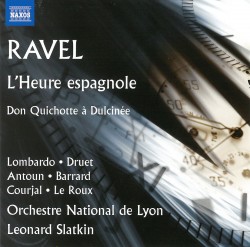 Ravel – L’Heure espagnole; Don Quichotte à Dulcinée
Ravel – L’Heure espagnole; Don Quichotte à Dulcinée
Lombardo; Druet; Antoun; Barrard; Courjal; Le Roux; Orchestre National de Lyon; Leonard Slatkin
Naxos 8.660337
Maurice Ravel loved a challenge. Why else would he embrace the prospect of writing a new take on the comic Italian opera in French, on a Spanish theme? The Spanish Hour, filled with flirtation, comical characters and cuckolds, is far from being a bedroom farce. It is, instead, a great example of Ravel’s musical genius, especially when it comes to orchestration. While he pays homage to the Spanish musical idiom, he also respects the distinct musicality of the French language, whether scoring the straightforward observations of Ramiro, the rapid plotting of Concepción, or the over-the-top buffoonery of Gonzalve and Don Inigo. The result is playful, poetic and impressionistic.
The accompanying work, three songs of Don Quixote sung to Dulcinea, has a much less happy theme – and history. It is the very last thing Ravel composed (in 1933) and was commissioned by the celebrated film director, G. W. Pabst for a new film version of the story of the knight of La Mancha. Alas, as they say in the film biz, it ended up on the cutting room floor and was replaced by Jacques Ibert’s four songs on the same theme. This insult galled Ravel to the point of considering a lawsuit against the producers, but he eventually gave up on this…quixotic pursuit. The film’s loss is our gain, as these songs remain a popular vehicle for baritone voice, as rendered here by François Le Roux, one of the leading exponents of French chanson.



